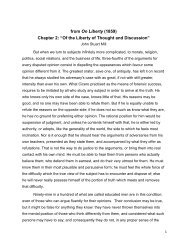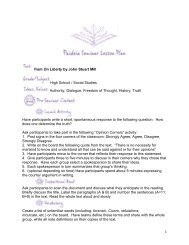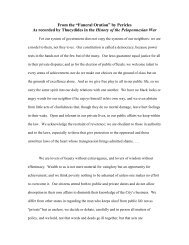Rousseau_contrat-social
Create successful ePaper yourself
Turn your PDF publications into a flip-book with our unique Google optimized e-Paper software.
philosophy or the blind spirit of faction sees in them no more than<br />
lucky impostures, the true political theorist admires, in the<br />
institutions they set up, the great and powerful genius which presides<br />
over things made to endure.<br />
We should not, with Warburton, conclude from this that politics and<br />
religion have among us a common object, but that, in the first periods<br />
of nations, the one is used as an instrument for the other.<br />
8. THE PEOPLE<br />
AS, before putting up a large building, the architect surveys and sounds<br />
the site to see if it will bear the weight, the wise legislator does not<br />
begin by laying down laws good in themselves, but by investigating the<br />
fitness of the people, for which they are destined, to receive them.<br />
Plato refused to legislate for the Arcadians and the Cyrenæans, because<br />
he knew that both peoples were rich and could not put up with equality;<br />
and good laws and bad men were found together in Crete, because Minos<br />
had inflicted discipline on a people already burdened with vice.<br />
A thousand nations have achieved earthly greatness, that could never<br />
have endured good laws; even such as could have endured them could have<br />
done so only for a very brief period of their long history. Most<br />
peoples, like most men, are docile only in youth; as they grow old they<br />
become incorrigible. When once customs have become established and<br />
prejudices inveterate, it is dangerous and useless to attempt their<br />
reformation; the people, like the foolish and cowardly patients who rave<br />
at sight of the doctor, can no longer bear that any one should lay hands<br />
on its faults to remedy them.<br />
There are indeed times in the history of States when, just as some kinds<br />
of illness turn men's heads and make them forget the past, periods of<br />
violence and revolutions do to peoples what these crises do to<br />
individuals: horror of the past takes the place of forgetfulness, and<br />
the State, set on fire by civil wars, is born again, so to speak, from<br />
its ashes, and takes on anew, fresh from the jaws of death, the vigour<br />
of youth. Such were Sparta at the time of Lycurgus, Rome after the<br />
33











